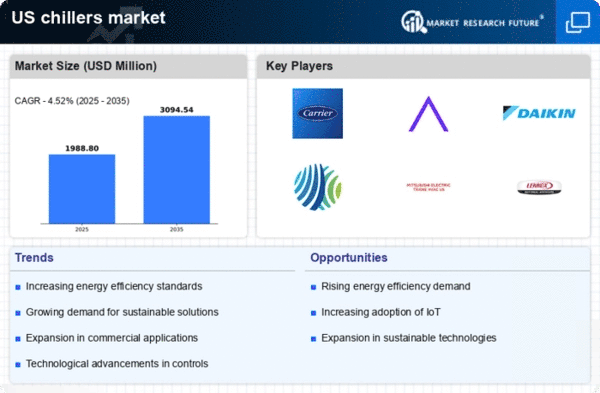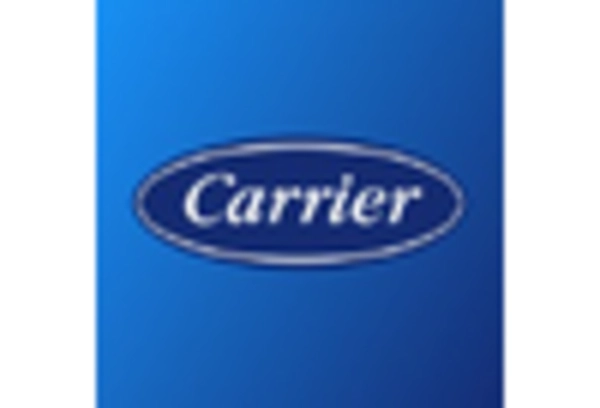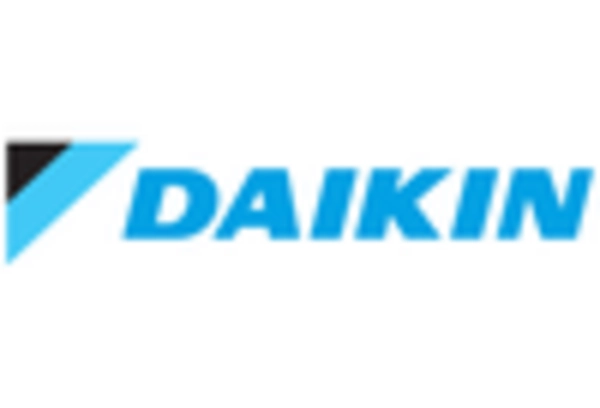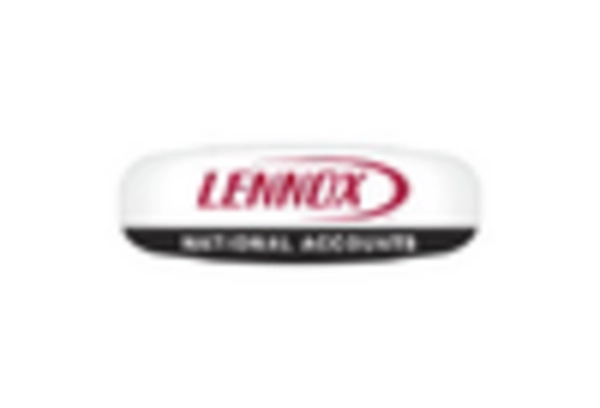Expansion of Data Centers
The expansion of data centers in the US is driving demand in the chillers market. As the digital economy grows, the need for efficient cooling solutions in data centers becomes paramount. These facilities require robust cooling systems to maintain optimal operating temperatures for servers and equipment. The chillers market is expected to benefit from this trend, with projections indicating that the data center cooling segment could account for a substantial share of the overall market. This growth is further supported by the increasing reliance on cloud computing and big data analytics, which necessitate advanced cooling technologies to ensure reliability and efficiency.
Increased Focus on HVAC Systems
The chillers market is witnessing a surge in demand due to the increased focus on HVAC systems across various sectors in the US. As commercial and industrial facilities prioritize climate control and energy efficiency, the need for high-performance chillers becomes critical. This trend is particularly evident in the construction of new buildings, where energy-efficient HVAC systems are often mandated by building codes. The market is likely to see a rise in the adoption of chillers that integrate seamlessly with modern HVAC solutions, potentially leading to a market growth rate of approximately 6% over the next few years. This focus on HVAC systems is expected to drive innovation and competition within the chillers market.
Rising Environmental Regulations
The chillers market is experiencing a notable influence from increasing environmental regulations in the US. These regulations aim to reduce greenhouse gas emissions and promote energy efficiency. As a result, manufacturers are compelled to innovate and develop chillers that comply with stringent standards. The market is projected to grow as companies invest in eco-friendly technologies, with an expected increase in demand for low-GWP refrigerants. This shift not only aligns with regulatory requirements but also enhances the competitive edge of businesses in the chillers market. Furthermore, the US government has introduced incentives for adopting energy-efficient systems, which could further stimulate market growth.
Growing Awareness of Energy Costs
Growing awareness of energy costs among consumers and businesses is significantly impacting the chillers market. As energy prices fluctuate, organizations are increasingly seeking ways to reduce operational expenses, leading to a heightened interest in energy-efficient chillers. This trend is particularly pronounced in sectors such as manufacturing and commercial real estate, where cooling costs can represent a substantial portion of total energy expenditures. The chillers market is likely to benefit from this shift, as companies invest in more efficient systems that promise long-term savings. Market analysts suggest that this awareness could drive a transition towards more sustainable cooling solutions, potentially increasing the market share of energy-efficient chillers.
Technological Advancements in Chiller Design
Technological advancements are significantly shaping the chillers market in the US. Innovations in chiller design, such as the development of variable speed drives and advanced control systems, are enhancing operational efficiency. These technologies allow for better load management and energy consumption optimization, which is crucial in a market that increasingly prioritizes sustainability. The integration of IoT and AI in chiller systems is also gaining traction, enabling predictive maintenance and real-time monitoring. As a result, the market is likely to see a surge in demand for these advanced chillers, with estimates suggesting a potential growth rate of around 8% annually over the next few years.
















